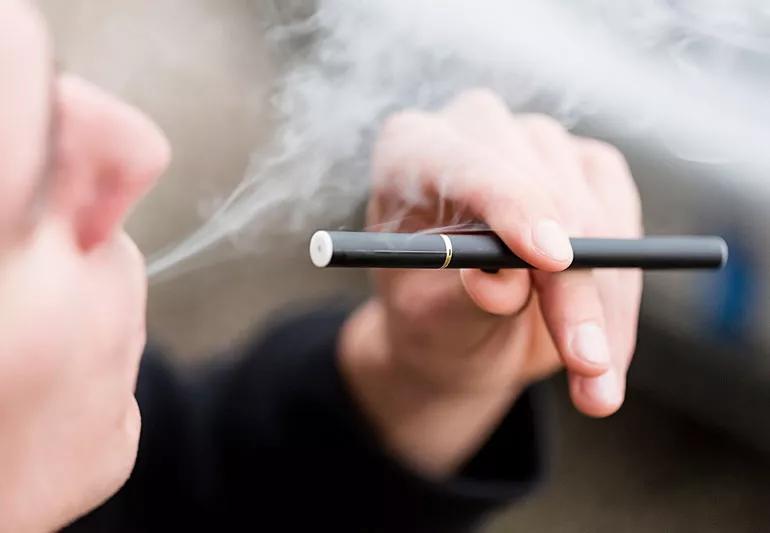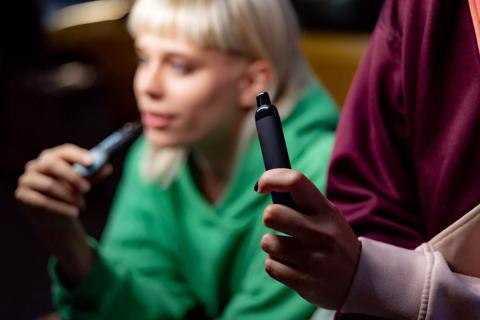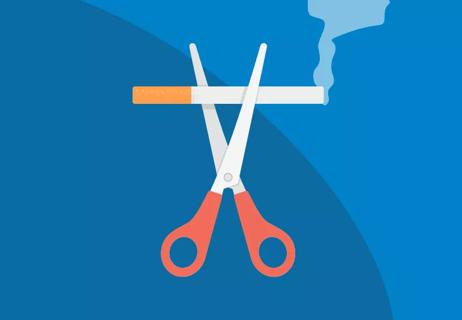More data that two are directly linked

The relationship between vaping and the spread of the coronavirus (COVID-19) has been an ongoing issue receiving a great deal of attention, particularly in teens. And, now, a new study provides more evidence directly linking the virus to vaping and the use of e-cigarettes.
Advertisement
Cleveland Clinic is a non-profit academic medical center. Advertising on our site helps support our mission. We do not endorse non-Cleveland Clinic products or services. Policy
Not only do experts believe vaping and e-cigarette use aids the spread of the virus but also that it hampers the body’s ability to fight the infection as well as recovery.
We talked with pediatric pulmonologist Fariba Rezaee, MD, about the study and about the impact vaping and e-cigarettes have on spreading the virus, the elevated risks associated with them and how difficult they make recovery.
The study, recently published in the Journal of Adolescent Health, looked at 4,351 teens and young adults ranging from ages 13 to 24; roughly half identified as "smokers" and half as "non-smokers." It looked into the link between COVID-19 and three factors: cigarette-only use, e-cigarette-only use and use of both. And what the study found is pretty eye-opening.
It found that those who had used both cigarettes and e-cigarettes in the 30 days before the survey were 6.8 times more likely to test positive for COVID-19 and 4.7 times more likely to have symptoms. Meanwhile, those who had used both at any point were seven times more likely to test positive.
Additionally, those who used only e-cigarettes in the 30 days before the survey were nearly twice as likely to test positive for COVID-19 while those who used only cigarettes in the 30 days before the survey were 1.5 more likely to test positive for the virus.
Advertisement
Any way you look at it, using cigarettes and/or e-cigarettes is bad news when it comes to COVID-19 and Dr. Rezaee explains to us why.
“It’s quite striking that patients who vaped and used e-cigarettes were even more at risk than patients who had used just regular cigarettes,” Dr. Rezaee says.
What’s more, that increased risk of COVID-19 contradicted some of the already-faulty thinking behind e-cigarettes. “It goes against the thinking by teens and young adults that they aren’t as bad for you as cigarettes,” she adds.
Another big danger for e-cigarette (and regular cigarette) users is how the use damages their lungs to the point where they’re more prone to severe illness and more difficult recoveries. “We saw with a previous study where patients who used e-cigarettes were more likely to come in really, really sick. They needed to go to the ICU, needed oxygen and needed more ventilation,” Dr. Rezaee points out.
Additionally, she says, “Even after discharge it was found that they still had residual problems with their lung functions.”
“It’s a perfect storm,” she adds. “With e-cigarettes and cigarettes, you damage your heart and your lungs and then you get COVID-19 which can cause even more damage to those systems.”
With all that in mind, it’s important to ask why people who smoke are at such a higher risk of contracting the virus. Dr. Rezaee says there are multiple factors.
One, she says, is nicotine, which, as mentioned before, damages your lungs and makes you more susceptible to illness. “In addition to that is the fact that some vaping and e-cigarettes products contain things like Vitamin E which you’re not supposed to inhale,” she says.
But there are reasons directly related to the coronavirus as well, she adds. “The people who smoke are putting their hands to their mouth and touching their own face constantly, which the CDC advises we not do to mitigate the risk of catching the virus.”
Dr. Rezaee also points out, “People who smoke are taking their masks off to smoke and if they do this when around others, exhaling around each other, it increases the risk of acquiring infection of the virus. And teenagers often share these products with one another, especially vaping and e-cigarette products, which greatly increases the risk of spreading the virus.”
One problem that may exacerbate the spread of the virus among teenagers via e-cigarettes comes from more widespread use. In a study that Dr. Rezaee led, it was found that teens who vaped had a background of anxiety, depression and other mental illness which makes them more susceptible to rely on e-cigarettes to manage the associated stress. This could also make them more vulnerable to the coronavirus.
Advertisement
It’s also worth noting that in that particular study, Dr. Rezaee says the teens who suffered lung injuries from e-cigarettes and vaping presented with symptoms that had a lot of overlap with COVID-19. “They not only had respiratory issues but some also had vomiting, diarrhea and needed oxygen.”
Whether perhaps masking COVID-19 symptoms or just making them more vulnerable to fighting off an infection, these lung injuries indicate serious trouble for teens who sustain them.
“It’s extremely important that we educate young people and give them the right information about how bad vaping and e-cigarettes are for them,” Dr. Rezaee says, “because so much of what they hear is from the internet which is often not true.”
For instance, because vaping and e-cigarettes give off more pleasant odors than the stink from traditional cigarettes and that may wrongly convince them that vaping isn’t as bad for your health.
“It’s also important that we empower these teenagers to advocate for their peers,” she says. “We’ve seen that teenagers are more likely to listen to their friends and peers than their own parents. So if we can advocate for that within this population, it could be incredibly helpful.”
Advertisement
Learn more about our editorial process.
Advertisement

Smoking can make symptoms from cancer treatment worse, and can even make treatments less effective

From dental diseases to cardiovascular problems, the harmful effects of smoking hookah have plenty of downsides for your health

Vaping exposes you to thousands of chemicals, including many that cause cancer and lung disease

Even only a couple cigarettes a day can lead to potentially deadly lung diseases like COPD and emphysema

Your risk goes down once you quit, but you may still need a lung cancer screening

Cigarettes increase your risk of developing the condition and worsening its effects

Health benefits start within 20 minutes and continue to grow for years after

Start having sex about 72 hours before ovulation, then at least every other day during your fertile window

Attachment theory suggests that your earliest relationships shape connections throughout your life

It isn’t a recognized mental health disorder, but research shows that problematic social media use can negatively affect your mental health, self-esteem and sleep